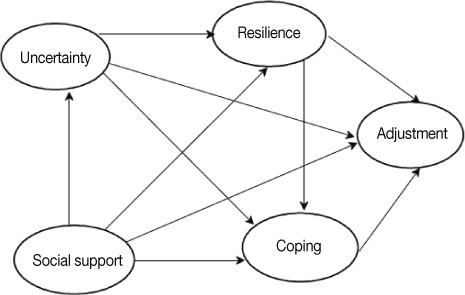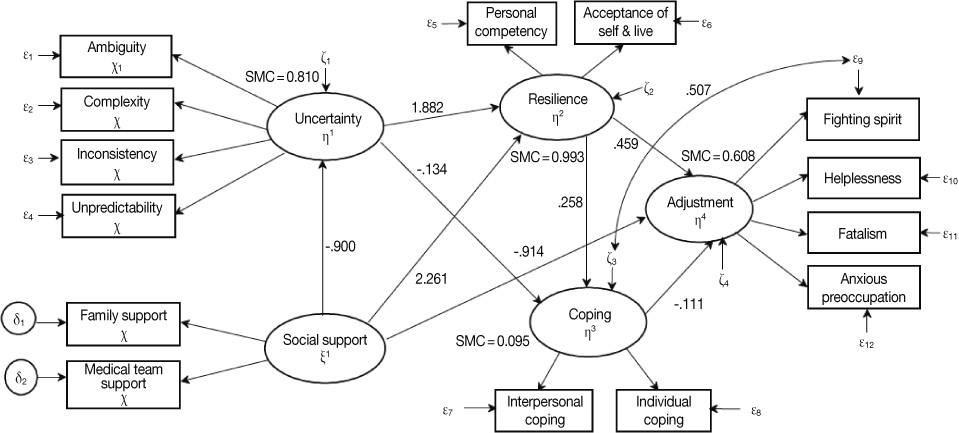J Korean Oncol Nurs.
2011 Aug;11(2):101-107.
Structual Equation Modeling on Adjustment of Cancer Patients Receiving Chemotherapy
- Affiliations
-
- 1Chung-Ang University Hospital, Seoul, Korea.
- 2Department of Nursing, College of Medicine, Chung-Ang University, Seoul, Korea. kyung@cau.ac.kr
Abstract
- PURPOSE
This study was to understand and explain the adjustment of cancer patients receiving chemotherapy. Variables in this model were social support, uncertainty, resilience and coping.
METHODS
The data were collected for approximately five months from May through to September 2006 with cancer patients receiving chemotherapy or cancer patients finished chemotherapy using self-administered questionnaires. Descriptive statistics program, Amos 5.0, was employed to verify the goodness of the hypothetic model and the hypotheses formulated in the study.
RESULTS
The fitness of the finalized model turned out to be improved (chi2=332.644, df=70, GFI=.809, AGFI=.714, RMSEA=.138, AIC=402.644). Those variables made a 60.8% prediction of the patients adjustment.
CONCLUSION
The hypothetic model presented in the study could serve to explain the adjustment of cancer patients receiving chemotherapy. Moreover, the use of the conceptual framework of the theory of planned nursing intervention would be very worthwhile as a strategy to boost the adjustment of cancer patients when receiving chemotherapy.
Keyword
MeSH Terms
Figure
Reference
-
1. Ministry of Health and Welfare. National cancer registry annual report, Central cancer registry division. 2008.2. da Costa Vargens OM, Bertero CM. Living with breast cancer: its effect on the life situation and the close relationship of women in Brazil. Cancer Nurs. 2007. 30:471–478.3. Jeon NY. Adjustment of teenagers with cancer: a path analysis of related variables [dissertation]. 2001. Seoul: Yonsei Univ..4. Kinsel B. Resilience as adaptation in older women. J Women Aging. 2005. 17:23–39.
Article5. Park EY. Adaptation aspects by causal attribution of cancer patients [dissertation]. 2006. Seoul: Korea Univ..6. Sim MK. Influence of resiliency factors on adaptation in families of children with cancer. Korean J Child Health Nurs. 2004. 10:383–394.7. Wierenga ME. The interrelationship between multidementional health locos of control, Knowledge of diabetes, perceives social support, self reported compliance and therapeutic oucomes six weeks after the adult patients has been diagnosed with diabetes mellitus [dissertation]. 1979. Esat Lansing: Michigan state Univ..8. Tae YS. Study on the correlation between perceived social support and depression of the cancer patients [master thesis]. 1986. Seoul: Ehwa Womans Univ..9. Sin IS. Factors Influencing quality of life in patients [master thesis]. 2005. Seoul: Kyunghee Univ..10. Mishel MH. Uncertainty in illness. Image J Nurs Sch. 1988. 20:225–232.
Article11. Lee IS. Uncertainty, appraisal and quality of life in patients with breast cancer across treatment phases [master thesis]. 2005. Seoul: Yonsei Univ..12. Wagnild GM, Young HM. Development and psychometric evaluation of the resilience scale. J Nurs Meas. 1993. 1:165–178.13. Song YS. Determinants of resilience of the physically disabled at home. 2004. Pusan: Kosin Univ.;[master thesis].14. Moorey S, Framptom M, Greer S. The cancer coping questionnaire: a self-rating scale for measuring the impact of adjuvant psychological therapy on coping behaviour. Psychooncology. 2003. 12:331–334.
Article15. Kim JN, Kwon JH, Kim SY, Yu SY, Hur JW, Kim BS, et al. Validation of Korean-Cancer Coping Questionnaire (K-CCQ). Korean J health psychol. 2004. 9:395–414.16. Lazarus RS. Pattern of adjustment. 1976. New York: McGraw-Hill.17. Watson M, Greer S, Young J, Inayat Q, Burgess C, Robertson B. Development a quetionnaire measure of adjustment to cancer: the MAC scale. Psychol Med. 1988. 18:203–209.
Article18. Lee MS. Relationship between breast cancer and coping style or emotional adaptation [master thesis]. 1997. Seoul: Seoul National Univ..19. Kang BC. Influencing factors on adaptation of people living with HIV/AIDS [master thesis]. 2003. Seoul: Seoul National Univ..20. Tak YR, Yun EH, Chon YS, An JY. Perceived social support as a predictor on adaptation of family who has a child with pediatric cancer. Korean J Child Health Nurs. 2003. 9:9–17.21. Kim ES, Park YW, Kim KA, Kim JY, Lee ES, Yun HY, et al. Stress, social support and coping among the family members of the patients in ICU. Clin Nurs Res. 2007. 13:123–134.22. Mishel MH. The Measurement of uncertainty in illness. Nursing Research. 1981. 30:258–263.
Article23. Mishel MH, Sorenson DS. Uncertainty in gynecological cancer: a test of the mediating functions of mastery and coping. Nursing Research. 1991. 40:167–171.24. Yoo KH. A study on the relationship between mastery and activity of daily life in rheumatoid arthritis patients. Korean J Rehabil Nurs. 2004. 7:207–212.25. Kim HY. Structural Model for Psychosocial Adjustment in Early Breast Cancer Patients [dissertation]. 2009. Gwangju: Chonnam National Univ..
- Full Text Links
- Actions
-
Cited
- CITED
-
- Close
- Share
- Similar articles
-
- Mediation Effect of Hope between Fatigue and Psychosoical Adjustment in Women with Breast Cancer
- The Effects of a Psychosocial Rehabilitation Approach on the Social Adjustment of People with Psychiatric Disabilities
- Influencing Factors on Depression in Stomach Cancer Patients Receiving Chemotherapy
- Proper Oral Hygiene and Dental Care for Cancer Patients
- Difference of Oral Mucositis in Hospitalized Cancer Patients Receiving Chemotherapy



